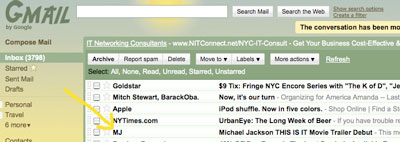It seems the production company AEG Live is e mailing potential ticket buyers as Michael Jackson–“MJ”, to a few hundred thousand of his closest friends, actually–to promote the upcoming movie This is It, which features Jackson’s last rehearsals.
 Obviously this is beyond absurd because the man passed away. That said, it did make me think about faux personalized e mails. For the past two years, for example, I’ve been getting e mails “from” Barack Obama, and I have to say I like seeing his name in my Inbox. I wonder, then, if a presenter was marketing a Hilary concert if it would be effective to send an e mail to potential ticket buyers “from” her. Would artists be uncomfortable lending their names to such direct marketing of their concerts? Would it sell more tickets? It certainly gets my attention when names of artists who I don’t work for pop up in the ol’ Inbox. Like if “Arvo Pärt” had “e mailed” to “tell me personally about” his In Principio disc? I would have knocked over the laptop reaching to open that.
Obviously this is beyond absurd because the man passed away. That said, it did make me think about faux personalized e mails. For the past two years, for example, I’ve been getting e mails “from” Barack Obama, and I have to say I like seeing his name in my Inbox. I wonder, then, if a presenter was marketing a Hilary concert if it would be effective to send an e mail to potential ticket buyers “from” her. Would artists be uncomfortable lending their names to such direct marketing of their concerts? Would it sell more tickets? It certainly gets my attention when names of artists who I don’t work for pop up in the ol’ Inbox. Like if “Arvo Pärt” had “e mailed” to “tell me personally about” his In Principio disc? I would have knocked over the laptop reaching to open that.

I think the impersonating phenomenon only works for naive Top 40 teenagers and college kids who assume that Britney Spears and Miley Cyrus is actually writing their own twitters, facebook fan pages, blogs, etc. Unfortunately for classical music, most of the fans are jaded, cynical, crossword-loving senior citizens who can see through the ploy. And just for the record, Arvo Pärt and I exchange chili recipes and gardening tips over AIM.
Like if “Arvo Pärt” had “e mailed” to “tell me personally about” his In Principio disc? I would have knocked over the laptop reaching to open that.
Cosign that. (Well, I don’t have a laptop, but the spirit of the remark.)
The Hilary Hahn idea would also work on me, mostly because I can see her actually sitting down to draft an e-mail to be used for such purposes, in a way that I cannot see eternal classical music bugaboo Britney doing so. Hilary has a history of writing things for public consumption and all.
I hate faux personalized emails. Tacky. Just a bit on the fraudulent side too.
Our email newsletter folks know it’s a newsletter; there’s no attempt to make believe it’s anything else. Concert invites, etc., our folks usually pretty much understand it’s a newsletter mailing for that purpose.
When they get an email addressed personally, they know it come from us as a personal note! and it’s appreciated as such.
I think that’s more respectful and ethical, personally.
This is a marketing strategy that would absolutely work (and does work). Every symphony orchestra should employ this when they have a guest artist and an email list. And, on the concerts when there is no guest artist, the music director should do this. It’s part of the engaging a community through current media and communication that is necessary for the survival of the organization. I surprised that Hilary doesn’t do it already (and when she does, please add me to her list). My sister, who is a rock singer, has employed this marketing/communication technique for many years and it has helped her maintain her fan base, sell tickets to shows and events, and sell merchandise and recordings.
Twitter is also a very important way to get information out in a personalized way. Every solo artist and conductor should have a Twitter base and send out regular updates about concerts, events, merchandise and recordings. The technology is almost free and the access and participation it creates is enormous.
When I was kid my grandfather took me to a Phillies game, and the promotion that day was a baseball autographed by the whole team for all kids 12 and under. I was so excited for that ball, but when I got to the ballpark I was distraught to find that it was a cheap, rubber ball with the signatures printed on. Faux personalized messages always remind me of that ball.